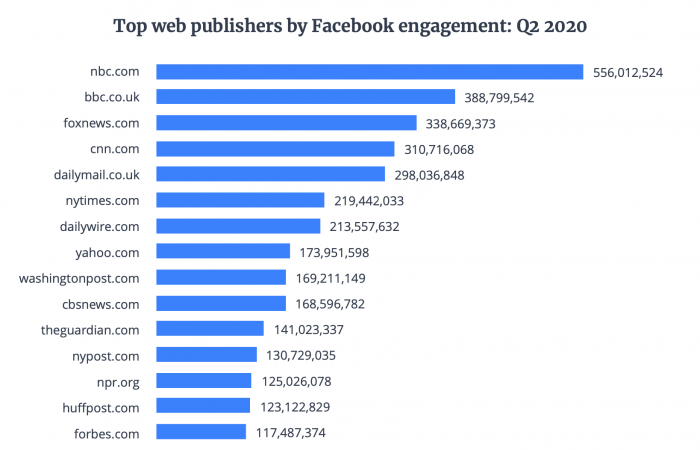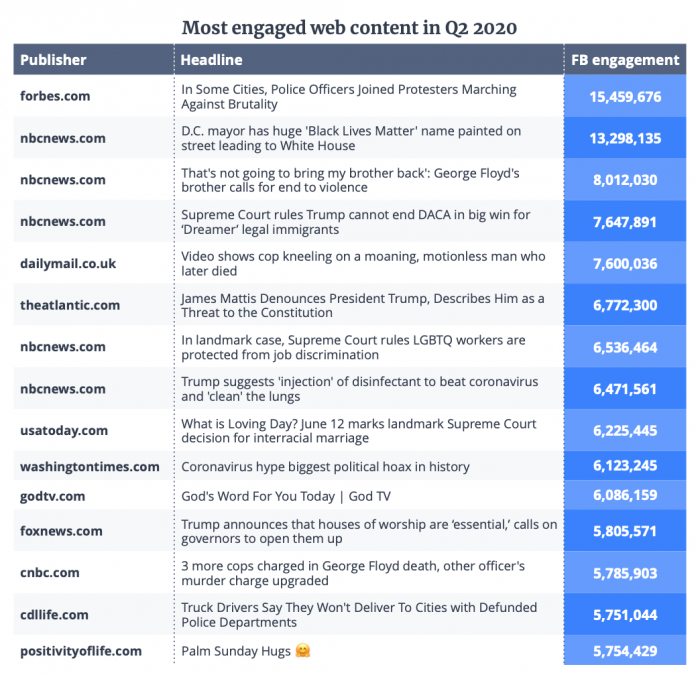Coverage of Black Lives Matter protests and the coronavirus pandemic pushed engagement on Facebook to an all-time high this quarter.
A new report from NewsWhip, a social media tracking company, shows that the two topics garnered more engagement — likes, shares, the new caring emoji reaction, etc. — on Facebook than all content in the same quarter of 2018.
Of the two, the coronavirus drove engagement more consistently, with 3.6 billion Facebook engagements to content about the virus and the measures taken to stop it. The BLM protests, however, reached higher highs this quarter, with the week immediately following George Floyd’s death seeing coverage reach 550 million engagements. The killing and the protests that erupted saw more than 1.5 billion engagements.
Although fewer of the top 10,000 posts analyzed by NewsWhip were link posts — photo posts still take the cake — engagement on posts linking to web articles reached an all time high. “Most of the engagement is likely occurring away from public Pages, whether that be in groups or person-to-person sharing,” according to the report.
What else did the report have to say?
A pandemic and protests against police brutality killed the appetite for “soft news.” Instead of puppies and Baby Yoda, Facebook’s top stories were about a global pandemic and protests. NewsWhip reported “a full transition” away from the soft news responsible for most of the top articles toward the end of 2019.
Only 14 of the top stories were what we determined to be soft news — that is anything to do with inspiring memes/sayings, cute pets, or children, etc. We had seen these make up more than half of the top stories in previous iterations of this report.
Top publishers dominated the conversation. Big publishers generated the lion’s share of the conversation, with the top 20 publishers responsible for more than 35 percent of the top articles. “This is the most dominant we have seen the top publishers since we started analyzing the distribution last year,” the NewsWhip report read.
The @NewsWhip Facebook Publishing report is out for Q2 2020
There were over 16 billion Facebook engagements on web content in Q2 2020, compared to 7.4 billion in Q2 last year. Definitely not precedented!
Download here: https://t.co/TYjjlCLBw7@CNN @DailyMail @ONA @NBCNews pic.twitter.com/v7yzweGbHw
— Jonathan Barnes (@JonathanBarnes_) July 14, 2020
NewsWhip includes subsidiaries in its rankings so, for example, the NBC and Fox numbers include engagement received by local news stations in their network. Using that rubric, NBC topped the publishers chart — followed by BBC, Fox News, CNN, Daily Mail, and The New York Times.

The list of most engaged articles was topped by Black Lives Matter coverage. Among the top 100 articles on Facebook from April through the end of June, coverage of Black Lives Matter protests (29 articles) and Covid-19 (27 articles) appeared the most often. Taking the No. 1 spot was a Forbes piece about police officers joining BLM protests that received nearly 16 million engagements.

Former Secretary of Defense James Mattis’s condemnation of President Trump as divisive and dangerous and coverage of Supreme Court decisions past (Loving Day) and present (LGBTQ protections) also broke the top 10.
The most controversial articles drew the most comments. As we’ve seen before, the stories that received the most comments include some of the most controversial stories that NewsWhip included.Per @NewsWhip, this was the 10th most engaged story on Facebook last quarter. pic.twitter.com/6ymNCfOarO
— Evan McMurry (@evanmcmurry) July 14, 2020
The most commented was NBC News’ article about Trump suggesting “injection of disinfectant” for treating COVID-19, which saw more than 3 million comments. Aunt Jemima changing its branding was also a highly commented article, receiving 2.3 million Facebook comments.
The most-used reactions were likes and shares. In April, Facebook added a new “care” reaction but users are still sticking with the classics; more than 75 percent of engagement tracked by NewsWhip were likes or shares.
You can download the full report here.
Leave a comment
You must be logged in to post a comment.